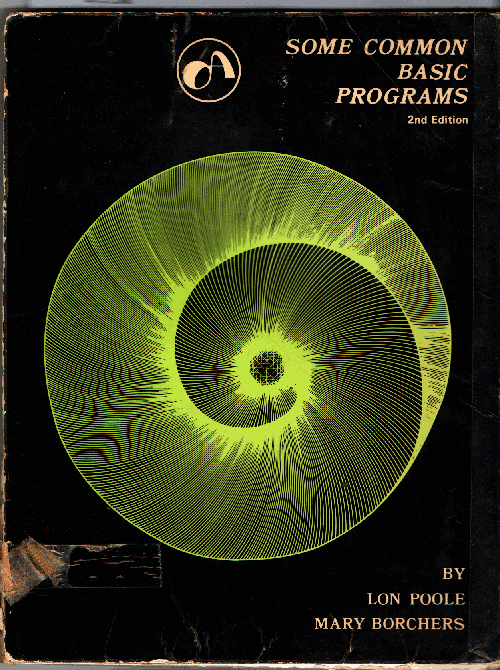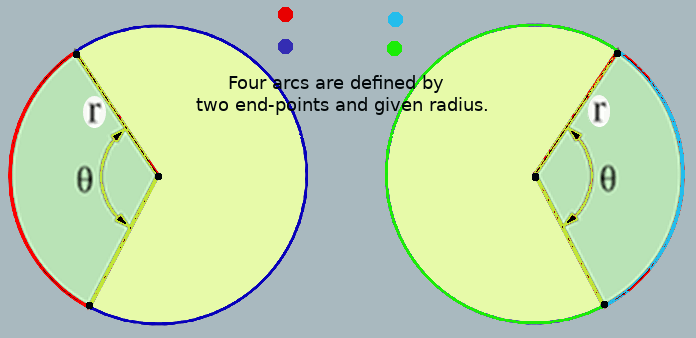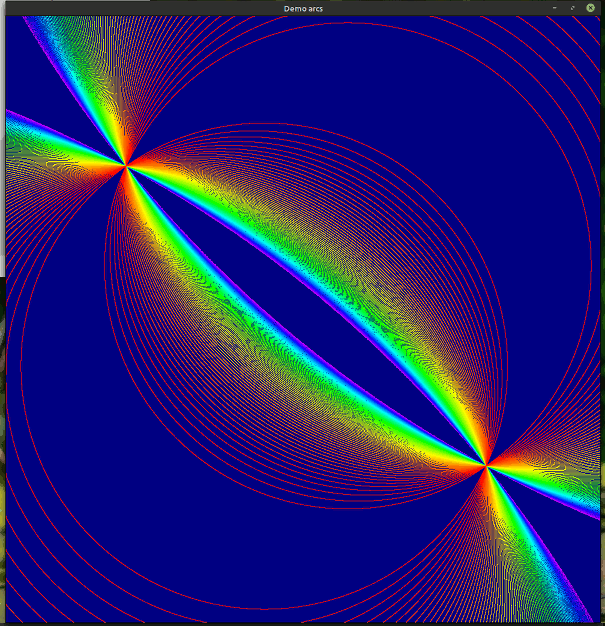Drawing and using arcs of circles.



Could I reproduce this graphic? Circles and spirals are easy, but I'd never drawn arcs. Was it even a genuine computer picture- 1978 meant computer graphics available to amateurs were primitive. Perhaps a spirograph contraption? I put it on the LB Forum as a challenge and Rod, Anatoly and Bplus produced excellent efforts.
Given two points and a circle-centre there are four arc solutions in two mirror-image pairs.

The geometry is basically right-angle triangles and trig. It still took some time before I was happy with my own solutions. Then I realised there were already solutions on Rosetta Code...
I now concentrated on fun USING arcs, and hope to come up with further variations. I use HSV colouring to get results I find pleasing.


'[RC] Circles of given radius through two points
nomainwin
global col$, pi, state$
pi =atn( 1) *4
WindowWidth =1000
WindowHeight =1040
open "Demo arcs" for graphics_nsb as #wg
#wg "trapclose quit"
#wg "fill darkblue ; color 100 255 255"
radius =2000
x1 = 200
y1 = 250
x2 = 800
y2 = 750
#wg "up ; goto "; x1; " "; y1
#wg "down ; circle 4"
#wg "up ; goto "; x2; " "; y2
#wg "down ; circle 4 ; flush"
[H]
call twoCircles x1, y1, x2, y2, radius
scan
radius =radius *0.98
if radius >400 then [H]
#wg "flush ; getbmp scr 0 0 1000 1040"
bmpsave "scr", "arcs.bmp"
notice "arcs2.bmp saved"
wait
sub quit h$
close #wg
end
end sub
sub twoCircles x1, y1, x2, y2, r
if ( ( x1 =x2) and ( y1 =y2)) or ( r =0) then wait ' single point or radius zero!
r2 =( ( x1 -x2)^2 +( y1 -y2)^2)^0.5 /2 ' half distance between points
if r one revolution
x =c *( 1 -abs( ( ( h /60) mod 2) -1))
m =v -c ' matching adjustment
select case
case h < 60
r = c: g = x: b = 0
case h <120
r = x: g = c: b = 0
case h <180
r = 0: g = c: b = x
case h <240
r = 0: g = x: b = c
case h <300
r = x: g = 0: b = c
case else
r = c: g = 0: b = x
end select
rd = abs( int( 256 *( r + m)))
gn = abs( int( 256 *( g + m)))
bu = abs( int( 256 *( b + m))) ' NB csv version .. <<<<<<<<<<<<<<<<<<<<<<<<<<
col$ =right$( " " +str$( rd), 3) +" " +right$( " " +str$( gn), 3) +" " +right$( " " +str$( bu), 3)
end sub
function ATAN2( y, x)
Result$ = "Undetermined"
If ( x =0) and ( y >0) then ATAN2 = pi /2: Result$ ="Determined"
if ( x =0) and ( y <0) then ATAN2 =3 * pi /2: Result$ ="Determined"
if ( x >0) and ( y =0) then ATAN2 =0: Result$ ="Determined"
if ( x <0) and ( y =0) then ATAN2 =pi: Result$ ="Determined"
If Result$ <>"Determined" then
BaseAngle =ATN( abs( y) /abs( x))
If ( x >0) and ( y >0) then ATAN2 = BaseAngle
If ( x <0) and ( y >0) then ATAN2 = pi -BaseAngle
If ( x <0) and ( y <0) then ATAN2 = pi +BaseAngle
If ( x >0) and ( y <0) then ATAN2 = 2 *pi -BaseAngle
end if
End Function
function cosRad( t)
cosRad =cos( t /57.29577951)
end function
function sinRad( t)
sinRad =sin( t /57.29577951)
end function